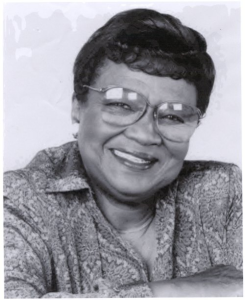|
|
|
Rosetta was born in the heart of the
Hell’s Kitchen neighborhood of New York
City on August 8, 1911.
When Rosetta was only fifteen, she got
a job as a chorus girl working with her
godfather, Bill “Bojangles” Robinson.
Her singing teacher and mentor was
Eubie Blake. In 1939, she made her
Broadway debut in Mike Todd’s The Hot
Mikado, the first all African-American
production to grace the Great White
Way. She was a member of Orson Welles’
all-black version of the WPA MacBeth.
Other Broadway productions include A
Streetcar Named Desire, The Sunshine
Boys, Lost in the Stars, Destry Rides
Again, I Had A Ball, Sophie, The Royal
Family, Blues for Mr. Charley, You
Can't Take it with You and the revival
of Cabin in the Sky. Rosetta portrayed
Stella in Anna Lucasta on for two years
on Broadway, as well as in the film
version with Sammy Davis Jr. and Eartha
Kitt.
Rosetta went on to perform on such
television hits as Benny’s Place with
Louis Gossett, Jr., Search for
Tomorrow, The Guiding Light, Amen, A
World Apart, Amen and played Nell
Carter’s mother in Gimme A Break.
Rosetta’s film credits include Moscow
on the Hudson, The Sunshine Boys,
Playing for Keeps, Daniel, Whatever it
Takes, and Brewster’s Millions. For
eight years, Rosetta portrayed Mother
Winslow on Family Matters.
In 1968, Rosie founded Amas Musical
Theatre (“you love” in Latin), a non-
profit, multiracial theatrical
organization devoted to the creation,
development, and professional
production of original musicals and to
the training and encouragement of new
musical theatre talent. On Amas Musical
Theatre, Rosie has said: “I produce
musicals. Music is one avenue where no
one seems to have any discriminatory
attitudes. Theatre techniques are a
marvelous implement to bring people of
all races, color and creeds together.
You don’t worry about what color is;
all you care about is the end
product.”
Rosetta received the Kennedy Center
Black Playwright’s Award for Excellence
in developing new works, the Richard L.
Coe Award for extending the boundaries
of theatre. In 1985, Archbishop John J.
O’Connor presented Rosetta with the
Pierre Toussaint Medallion.
In September 1999, Rosetta’s unique
contribution was further recognized by
President and Mrs. Clinton when they
honored her as a recipient of the 1999
National Medal of Arts.
Rosetta has also been memorialized by
Actor’s Equity Association by
establishing an annual award in her
name. This award is given to producers
who follow in the multiracial tradition
began by Rosetta. According to the late
Colleen Dewhurst, then President of
Actor’s Equity, Rosetta received this
honor “in recognition of her
outstanding artistic contributions to
the universality of the human
experience in the American Theatre.”
|
|
|
|

|
 WON
WON

